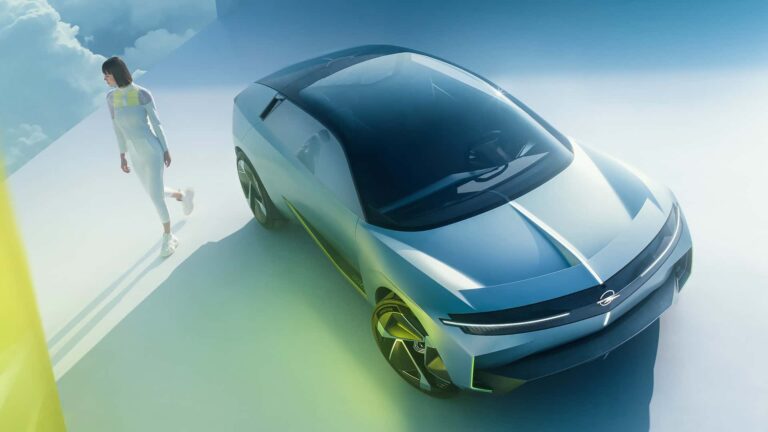The Opel Experimental battery-powered crossover concept car has been officially unveiled by the German brand that’s currently under the umbrella of the automotive giant Stellantis, paving the way for the next generation of production vehicles in terms of design and possible technology integration.
Scheduled to be shown to the public for the first time during this year’s IAA Mobility show in Munich in September, the Opel Experimental EV is based on what the company calls “the state-of-the-art Stellantis BEV platform,” which in our minds sounds a lot like the STLA platform.
Featuring all-wheel drive and a steer-by-wire system that enables the steering wheel to be tucked away when it’s not needed, the Russelsheim-based car maker’s zero-emissions concept has external dimensions that put it in the European C segment, so it should be smaller than a Tesla Model Y but similar to the upcoming Opel Grandland all-electric crossover which will be underpinned by the STLA Medium platform.
“The Opel Experimental gives a glimpse of upcoming models and technologies, of future design, yes, of a new era and the future of the brand. This breathtaking concept vehicle points our way forward and once again shows Opel’s pioneering spirit,” said Opel CEO Florian Huettl.
The German car marque says that the Experimental EV’s most striking feature is the complete absence of chrome from its sleek silhouette, which has been substituted by lighting elements and bold, high-contrast graphics that underline the coupe crossover’s proportions.
Up front, there’s an illuminated Opel Blitz and the signature compass of the German brand that’s flanked by elongated headlights. At the back, sleek tail lights complete the futuristic look of the crossover.
The Experimental features air flaps at the front and rear as well as a rear diffuser which extends or retracts depending on the driving conditions to improve the aerodynamic efficiency. Furthermore, the tires – developed in cooperation with Goodyear – are made out of recycled rubber and sit on three-zone Ronal wheels which further increase efficiency with their aero design, Opel says.

Opel Experimental interior sketch

“Our new Opel Experimental shows a more technical and even more pointed interpretation of our bold and clear design philosophy. With it, our vision of the future takes shape. Many of its design elements and the underlying philosophy will be reflected in future production models. The body design combines the best aerodynamics with an unmistakable silhouette. And the interior conveys an intense, emotional user experience,” said Opel design chief Mark Adams.
Overall, the outside has a hint of Lancia Pu+Ra HPE, which is also based on a version of Stellantis’ STLA platform, but it’s worth mentioning that the Italian concept car is smaller than what Opel has come up with.
Inside, the Russelsheim car maker says there’s enough space as in the D-segment vehicle, thanks to what’s billed as Space Detox. In other words, the lightweight seats, retractable steering wheel, and absence of everything that’s not essential for driving make for a roomy cabin that feels like it’s bigger than it actually is.
The conventional screens that a lot of people love to hate have been replaced by an augmented reality projection system that displays information or entertainment above the dashboard. Traditional side mirrors are also nowhere to be found, as they’ve been replaced by fully integrated 180-degree cameras that sit inside the C-pillars.
Details about power, battery capacity, or potential range haven’t been announced, but seeing how this is purely a concept car, these things aren’t hugely important. However, the specs of the subsequent production vehicles based on the Opel Experimental will be an important piece of their potential success when they hit the market.


